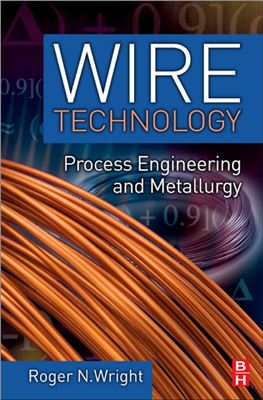Butterworth-Heinemann, Elsevier, 2011, 320 pages
Wire drawing is a metalworking process used to reduce the diameter of a wire by pulling the wire through a single, or series of, drawing die(s). The engineering applications of wire drawing are broad and far-reaching, including electrical wiring, cables, tension-loaded structural components, springs, paper clips and spokes for wheels.
This all-new, classical text is the first to explain the complex theory and sophisticated engineering concepts with relation to wire drawing in an accessible and universal way for practicing engineers.
Designed to facilitate the entry and training of new engineers and upgrade the professional practice of those already in the field in the face of increased product demands and tightening specifications, this essential resource by industry expert Roger Wright provides:
A technical overview and introduction of engineering concepts related to wire drawing, suitable for beginners and practiced engineers looking to brush up on the theory behind the process
An interface with basic engineering education so as to provide an accessible introduction for engineers new to the field
Real-world worked examples, problems and protocols based on true life engineering scenarios and challenges
Unique coverage of the author's own pass design and risk prediction calculations, developed through decades of research and wire industry consulting
Whilst most competing titles are less practical in their approach and focus on either ferrous, non-ferrous or electrical, our book takes a universal approach more suited to the practicing engineer who needs knowledge of wire drawing across the board. Ideal for use as a complete insight into the process from start to finish or a dip-in resource for practical problem-solving, this versatile work-a-day guide, training tool and desk reference will help readers train their staff and adapt and improve processes at minimal cost for maximum performance.
Wire drawing is a metalworking process used to reduce the diameter of a wire by pulling the wire through a single, or series of, drawing die(s). The engineering applications of wire drawing are broad and far-reaching, including electrical wiring, cables, tension-loaded structural components, springs, paper clips and spokes for wheels.
This all-new, classical text is the first to explain the complex theory and sophisticated engineering concepts with relation to wire drawing in an accessible and universal way for practicing engineers.
Designed to facilitate the entry and training of new engineers and upgrade the professional practice of those already in the field in the face of increased product demands and tightening specifications, this essential resource by industry expert Roger Wright provides:
A technical overview and introduction of engineering concepts related to wire drawing, suitable for beginners and practiced engineers looking to brush up on the theory behind the process
An interface with basic engineering education so as to provide an accessible introduction for engineers new to the field
Real-world worked examples, problems and protocols based on true life engineering scenarios and challenges
Unique coverage of the author's own pass design and risk prediction calculations, developed through decades of research and wire industry consulting
Whilst most competing titles are less practical in their approach and focus on either ferrous, non-ferrous or electrical, our book takes a universal approach more suited to the practicing engineer who needs knowledge of wire drawing across the board. Ideal for use as a complete insight into the process from start to finish or a dip-in resource for practical problem-solving, this versatile work-a-day guide, training tool and desk reference will help readers train their staff and adapt and improve processes at minimal cost for maximum performance.

